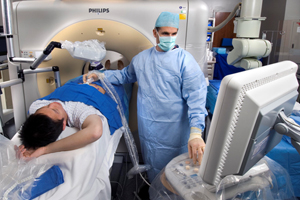The Interventional Radiology (IR) Laboratory in the Radiology & Imaging Sciences Department is focused on interventional oncology. Our lab focuses on three areas of interest:
- "Smart" drug delivery using novel drug and device combinations
- Multi-modality image fusion and electromagnetic navigation and CT integrated robotics to implement treatment plans and as a tool for drug discovery
- The operating room of the future which combines novel technologies and imaging methods to try to improve minimally invasive, image-guided therapies.
Research in the Interventional Radiology (IR) lab is motivated by the fact that image-guidance and minimally invasive approaches have revolutionized the management of many common diseases. However, diagnosis and therapy remain distinctly separated from each other in both time and space. We believe that this gap between diagnosis and therapy can be narrowed by minimally invasive image guided therapies and with the application of novel guidance technologies and engineered vectors. All research efforts in the IR lab are developed with a clear translational route to the clinic and address areas of urgent clinical need.

Examples of major research projects include:
- Combining temperature sensitive liposomes with RFA or MRI-guided high intensity focus ultrasound (HIFU) for the treatment of solid tumors
- Combining anti-angiogenic treatments with radiofrequency ablation (RFA) of solid tumors
- Developing imaging methods for targeted drug delivery systems
- Combining ablative techniques (RFA or HIFU) with immunotherapy of solid tumors
- "Smart" biopsy using electromagnetic navigation to correlate image and tissue for molecular-targeted therapies.

